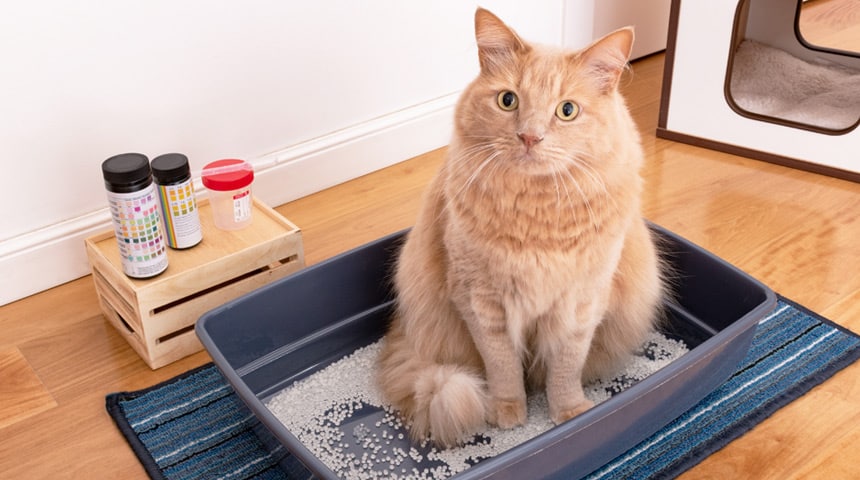
Chronic kidney disease in cats is a very common disease. The primary causes are rarely identified. It is defined as progressive destruction of more than 75% of the kidney nephrons, over a period of several months or years. The kidneys gradually lose their excretory, water and electrolyte regulation functions. The disease affects mostly older cats, but can also affect cats as young as 5 or 6 years old.
Diagnosis is most often achieved through blood work and urinalysis. An X-ray and/or ultrasound of the kidneys may also be helpful.
There are 4 stages to the disease; stage 4 being the terminal stage, where the kidneys can no longer play their role and uremic shock occurs, which inevitably leads to the death of the animal. Fortunately, if detected early, chronic kidney disease can progress more slowly and allow the cat to live longer and, with a very good quality of life.
Clinical signs vary depending on the stage of the disease. The most common signs are increased thirst and urine production, weight loss, decreased appetite, increased vomiting, bad breath, mouth ulcers, dehydration, etc.
When the diagnosis has been made, the veterinarian will recommend additional tests such as
- Blood pressure monitoring
- 80% of cats with CKD have high blood pressure
- A urine test called the protein/creatinine ratio
- Detects abnormal protein levels in the urine
- Urine culture
- Determines the presence of a secondary urinary tract infection
- A thyroid hormone evaluation if your cat is 6 years old or older
There is no cure for this disease other than a kidney transplant. Generally, based on his investigation, the veterinarian will recommend certain medications and a special diet to try to stabilize the condition:
- Omega 3 essential fatty acids supplement
- Helps reduce blood pressure within the kidney and oxidative stress related to CKD
- Pre-probiotic supplement for kidney support
- Helps metabolize uremic toxins, stimulates appetite and gastrointestinal health
- Medication - angiotensin receptor blocker
- Reduces blood pressure inside the kidney and controls protein loss
- Subcutaneous fluid therapy at home
- Corrects dehydration related to CKD
- Medication - anti-acid
- Increased urea levels in the blood can lead to stomach hyperacidity
- Medication - appetite stimulant
- A stimulant may be used to promote constant food intake when needed
- Potassium supplementation
- A decrease in blood potassium is often a consequence of the disease
- Phosphorus chelator
- Used when blood phosphorus levels are abnormally high
- Blood pressure medication
- Useful if an increase in blood pressure is detected
In a patient in uremic crisis (advanced stages), hospitalization with intravenous fluid therapy and supportive treatments are recommended. Unfortunately, this clinical manifestation is very life threatening, and the prognosis will be severely compromised.
Dietary recommendations are as follows:
- Geriatric diet for stages 1 and 2a
- Protein-controlled diet with moderate phosphorus and magnesium content for stages 2b, 3 and 4
Medical follow-up for renal failure:
- A physical examination every 6 months if the animal’s condition is good
- A blood test every 4 to 6 months
- A urology test every 6 months, depending on the case
- An evaluation of the blood pressure at least every 6 months
The prognosis depends on the disease stage and severity of the clinical signs. In the short term it is generally good, limited in the medium term, and poor in the long term since this disease is progressive. However, do not forget that early detection allows most cats to lead a normal life for several months or years if the recommendations of your veterinarian are followed properly.

